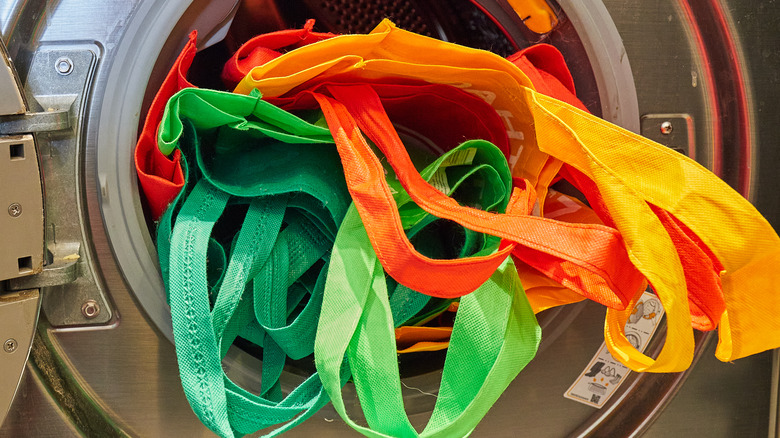Here's How Long Your Reusable Grocery Bag Should Last
Reusable grocery bags get put through a lot during their lifetime. They get loaded down with the week's groceries at the store; filled with fresh produce at the local farmers market; and packed to the brim with books at the library. Sometimes they serve as overnight bags or even just a bag to keep all of your other tote bags in.
For years, environmental groups have emphasized bringing your own bag to the store versus selecting from paper or plastic. Some stores no longer offer plastic bags for purchases, while others like Aldi allow you to either buy paper or plastic bags or bring your own. Tote Bag Factory lists conserving resources, saving money, aiding in decreasing pollution, and protecting wildlife among the reasons reusable bags should be brought to the grocery store. There are also many different options when it comes to choosing the right reusable bag. Good Housekeeping lists machine-washable totes, flexible bags that fold into a pouch, and polypropylene bags as just a few of the options available. They also often come in a variety of sizes, shapes, colors, and cute patterns, too.
Reusable grocery bags can go for the long haul
According to Tote Bag Factory, with proper care, reusable grocery bags can last many years. Key factors to making your bags last are washing them immediately after use, storing them properly, and not exposing them to too much sun or humidity. What you carry in the bags will also affect its lifespan, according to Tote Bag Factory. As can be expected, carrying heavy goods frequently leads to more wear and tear on the material, limiting how long you can use it.
Real Simple states that how you wash the bag depends on what kind of material it's made of. For nylon bags, use warm, soapy water and hand wash them. If you choose to toss them in the washing machine, use the gentle cycle. Then, dry the bag by hanging it on a clothesline or other place with good ventilation. Polypropylene bags can be hand washed and dried like nylon bags or wiped down with disinfectant wipes. Real Simple advises it's important to get into the creases and corners of both kinds of bags and the best way to do that is by turning it inside out for easier access. Once clean, it's best to make sure the bags are no longer damp before storing them. Also, Real Simple states to not keep them in a dark, damp space that might lead to bacteria growth.
Like so many things you own, if you take good care of your reusable bags, you'll get many years of use out of them.

